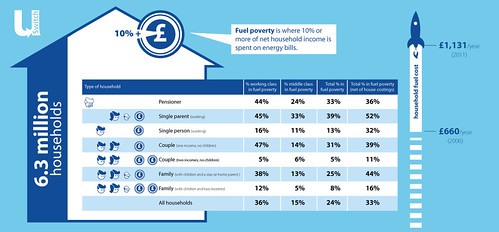
More people are in fuel poverty than previously estimated, according to a new formula proposed for assessing the problem.
And the outlook is "profoundly disappointing", according to the independent expert commissioned by the Government to review fuel poverty, with the scale of the problem set to treble by 2016 on 2003 levels.
Under the new formula, which counts people who have to spend more than the typical amount on fuel bills and where the costs push them below the poverty line, 7.8 million people in 2.7 million households in England were in fuel poverty in 2009.
This compares with 7.2 million people in four million households in fuel poverty in 2009, the most recent year for which figures are available, under the current measure that they spend more than 10% of their income heating their homes.
Official figures show that the number of households in fuel poverty has more than trebled since 2004 when 1.2 million families struggled to afford to heat their homes.
The new figures were revealed in a report from Professor John Hills at the London School of Economics and Political Science, commissioned amid concerns about the 10% measure.
The report suggests the new formula because existing figures include people who are not actually poor and do not focus on the twin issues of low incomes and high fuel costs, or measure the depth of the problem. Professor Hills warned fuel poverty was a "serious national problem" which will have trebled in scale from 2003 levels by 2016, the year by which the Government has targets to eradicate the problem.
The report also reveals how badly poorer households struggling with high energy costs are hit, having to pay hundreds of pounds more to heat their homes than better-off people paying typical bills. It shows that fuel-poor households with low incomes coupled with high energy costs spend an average £414 more for heating their homes than higher-income homes with typical energy bills.
Across England as a whole, this "fuel poverty gap" totals £1.1 billion and is set to rise to £1.7 billion by 2016 when fuel-poor households will face costs averaging almost £600 more than better-off homes with typical bills. Policies to improve the energy efficiency of homes by 2016 will only reduce the problem by a tenth, the report warned.
Energy and Climate Change Secretary Ed Davey said: "Fuel poverty is a serious national problem and this Government remains committed to doing all it can to tackle it and make sure that the help available reaches those who need it most. We were right to commission this independent review because we want to make our policies as effective as possible, and improving fuel poverty measurement is a key part of this."
The Press Association, photo: uSwitch




































